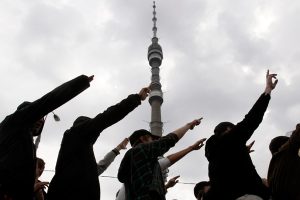In one of the longest, most closely researched and heavily footnoted studied published to date, Rais Suleymanov says that ethnic Russian Muslims have become “a significant factor in the Islamic community of Russia” and a major source of terrorist activists in part because they can more easily pass unnoticed in Russian cities.
In a 13,500-word article, the Kazan specialist at Russian Institute of National Strategy, says that the growth in the number of ethnic Russian Muslims reflects the effectiveness of Islamic propaganda in Russia, Islam’s attractiveness as “a protest religion,” intermarriage, and the weakness of Russians’ knowledge of their national faith and of the missionary work of the Russian Orthodox Church.
Suleymanov, who many Muslims believe is anti-Islamic, may be overstating the problem because he considers “ethnic Russian Muslims” not only those who are in fact ethnic Russians who have converted to Islam “but also representatives of those peoples who do not traditionally follow Islam but who use the Russian language as a means of communication with believers.”
Nonetheless and despite that limitation, his article provides extraordinary detail on dozens of specific cases of ethnic Russians who have converted, who have risen to the position of imam or mufti, and who have taken part in terrorist actions both within the Russian Federation and abroad.
Suleymanov suggests that such people “never become finally part of the community of ethnic Muslims even though for Russian society [they] cease to be Russians.” And he documents his suggestion that “the several thousand actively believing ‘ethnic Russian Muslims’ have produced in percentage terms many more terrorists than the five million Tatars who traditionally profess Islam.”
In his review, the Kazan-based scholar suggests there are four basic groups of ethnic Russian Muslims:
- Those who accept Islam because of their own spiritual searches and who often were deeply involved with other faiths including Orthodoxy earlier
- Those who join because of marriage
- Those who do so for pragmatic reasons
- And those who were POWs in Afghanistan or now Syria. Suleymanov says there are only a few dozen of the last group.
According to Suleymanov, “ethnic Russian Muslims quite quickly have come to occupy strong positions within the ummah of Russia because of their involvement with Wahhabi jamaats.” They are accepted because most Muslims see conversion to Islam as evidence of the truth and strength of their faith.
One consequence of this and of the fact that Islam does not focus on ethnicity is that ethnic Russian Muslims become part of the ummah as a whole rather than forming “any separate Russian diaspora inside it,” but because they lack an Islamic tradition, they are an easy catch for “radical ideological” groups, Suleymanov says.
“The main reason for the success of Islamic proselytism among particular representatives of the Russian people is that the majority of ethnic Russians up to now are cut off from their spiritual roots and in fact are not acquainted with the religion of their Orthodox Christian ancestors,” he says.
And Suleymanov concludes with what must be the most disturbing aspect of this trend: “The frequency of the participation of ethnic Russians in the ranks of terrorist bands … and also the geopolitical situation in which Russia is conducting military actions against ISIS in Syria” means that such Russian converts are going to be even more inclined to radicalism because they will be shunned by other Russians.

A second article this week, this one by Vladislav Maltsev, a Moscow journalist who writes frequently on religion in general and Islam in particular, adds to this portrait of ethnic Russian Muslims by reporting on one part of this trend: the tendency of some radical Russian nationalists to adopt Islam.
When Russia’s Supreme Court last week confirmed the sentence against Ilya Goryachev, the leader of the Militant Organization of Russian Nationalists (BORN), many assumed that this group was finished. But in fact, “many of its figures have remained in the shadows;” and not a few of them have become Muslim.
How could it be that those who profess national socialism could end by linking up with Wahhabism, Maltsev asks rhetorically. His answer is that both groups share a commitment to radicalism and the use of force and that it was only a matter of time that they would come together even if the former had very publicly persecuted the latter in the past.
Many Russian national socialists, he continues, view Islam as “’a religion of the strong’” and one that is prepared to act on its beliefs as in the “Caucasus Emirate.” One expert Maltsev cites says that “Jihad in the Caucasus is a conjunction of Islam and hatred to Russia and the regime. Slavs go to Chechnya because they can prepare for real military actions elsewhere.”
“Nine out of ten of them accept Islam there,” he says, “for it is a super-strong religion.”
Roman Silantyev, a controversial specialist on Islam in Russia, agrees. He told Maltsev that “people with protest or criminal attitudes really form a significant percent of those who convert not only to Islam in general but also to Islamic sects” like Wahhabism. As a result, “ethnic Russian Muslims represent a greater terrorist threat” than other Muslims.




